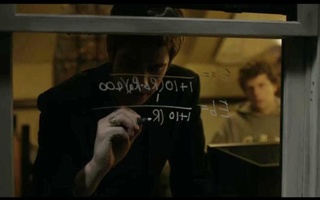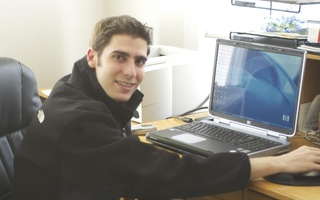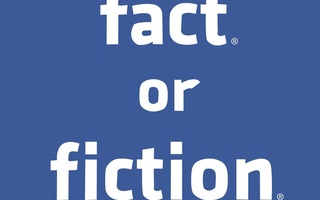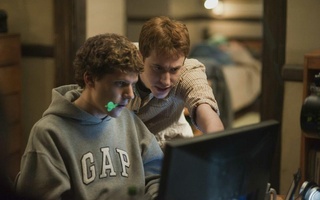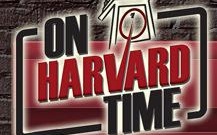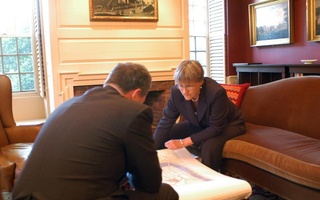
Harvard affiliates and Harvard Film Archive members line up for a screening of the film The Social Network yesterday.
“The Social Network’s” thorough, if dramatized, depiction of life at Harvard evoked gleeful laughter from undergraduate audience members during yesterday’s advanced screening of the film, which hits theaters nationwide Oct. 1.
Two days before its premiere in New York City, “The Social Network” was shown at the Harvard Film Archive last night to Harvard affiliates and members of the Film Archive.
The showing was attended by Aaron Sorkin, the movie’s illustrious screenwriter, Jesse Eisenberg, who plays former Harvard undergraduate and Facebook creator Mark E. Zuckerberg, a former member of the class of 2006, and Armie Hammer, who plays twins Cameron S. and Tyler O.H. Winklevoss ’04.
In a question-and-answer session that took place after the credits rolled, Sorkin repeatedly affirmed the accuracy of the film.
“I wouldn’t do anything that messes with a real person’s life,” he said.
“I understand that this is an unusual movie, but it’s a non-fiction movie,” Sorkin later added.
While researching the film, Sorkin said he visited the Phoenix S.K. Club and also received an offer to visit The Fly Club—which he declined because of what Sorkin called a burdensome and costly offer, referring to possible contracts involved.
“I got into the Phoenix for free,” he said.
Sorkin also sat down with Natalie Portman ’03, while he was doing research for the film. When Portman was a freshman she dated the former President of the Porcellian Club, according to Sorkin.
Sorkin also briefly criticized Harvard’s final clubs during the talk.
“I get how cool exclusivity is, but that’s frankly all it is,” he said.
In the film, getting into final clubs is portrayed as the object of Zuckerberg’s undergraduate desire.
Ultimately, he ended up in the fraternity Alpha Epsilon Pi instead, which is featured unflatteringly in the film.
“It was kind of a harsh portrayal,” said Colin H. Santangelo ’11, a member of the fraternity Sigma Alpha Epsilon.
Santangelo called the film’s depiction of final clubs “a stereotype that exists, but I don’t think it’s representative of what exists.”
In the film, a bus-load of well-dressed women arrive at the movie’s version of the Phoenix, where two women proceed to make out, while others wear only lingerie.
In the same sequence, the movie cuts to an intoxicated Zuckerberg, in his Kirkland dorm room, programming frantically.
Adrian A. Diamond ’11, a member of a final club, said the movie was “definitely dramatized.”
Both Eisenberg and Hammer told the audience that they worked to portray their characters accurately.
“We uncovered that when you walk on this campus you carry a lot of pride,” Hammer said, who played the two twins who sued Zuckerberg.
“[The Winklevoss twins] were human guys who felt like they were wronged,” he added.
Eisenberg said he watched “every video and read every interview and looked at every picture” of Zuckerberg, before filming began.
“I had to figure out why he inverts and why he detaches,” he said. “There’s always a reason even if it may appear there’s an emptiness.”
—Staff writer Eric Newcomer can be reached at newcomer@fas.harvard.edu.
Read more in News
Harvard President Faust Throws First Pitch at Fenway








